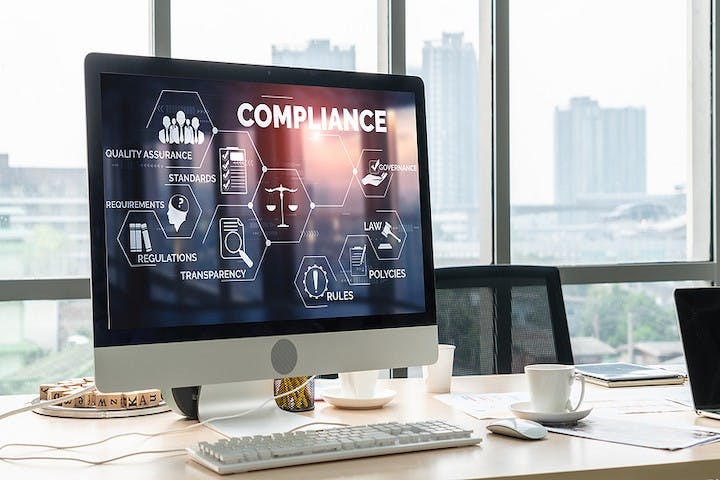If you think compliance software sounds like a dry topic, it really isn’t.
In HR making sure companies stay compliant is one of ‘the’ major ongoing concerns.
As Christopher Kiklas, VP of product management for UKG’s SMB HCM suite, recalls, on the days when he was running his own small business: “I didn’t realize there was a whole batch of new compliance rules I needed to meet when I hit having 50 employees – and my software didn’t warn me.”
The fact is, whether you are the CEO of a small company or an HR professional tasked with maintaining compliance – it’s a topic that never goes away. But for this very reason, it is also one that can be both emotional and draining.
It’s always changing!
Compliance is complex partly because the rules keep on changing.
Just think about the difficulty of complying with ACA, EEOC, and FLSA to name just a few.
You are expected to get it 100% correct and if you do not, errors (mistaken or otherwise), can lead to very painful penalties.
But this is where compliance software can be a wonderful thing.
To the extent software can take the burden off your shoulders, it is a blessing.
However, it’s only a blessing if it works.
As Matt Gotchy, EVP marketing at Trusaic, an HR compliance vendor, says: “You need to ask the hard questions. Bring in your subject matter experts to scrutinize the methodology. Don’t just assume the vendor has the capabilities you need. You need to take extra care when choosing vendors offering compliance software.”
So how do you select a reliable vendor of compliance software?
For any software purchase, you will want to consider features, costs, and support.
But for compliance software especially, the following six factors should also play a prominent role in your buying decision:
- Track record: While one sometimes wants to give new companies a chance, it’s hard to be confident unless a vendor has a proven track record.
- Experience in your industry: The nature of the workforce can vary a lot from industry to industry and that can create unique compliance issues. A vendor that is an expert in one industry may make mistakes in a different one.
- Support in interpreting the legislation: Chances are you will want your vendor to be an expert in the relevant legislation and advise you on how to handle details or new regulations. There may be a strong outsourcing or service element to the vendor’s offering. A vendor with a nuanced understanding of the legislation will be a good bet.
- Automated updates: Software should automatically be updated to track changes in legislation.
- Understanding of data: It’s not enough that a vendor has good software and a good understanding of the legislation; they have to have a good understanding of the necessary data and how it is collected. Bad data will undermine everything else.
- Audit trails and reporting: Comprehensive audit and reporting capabilities will help ensure nothing has gone off the rails. They should also diagnose any causes should problems arise.
UKG’s Kiklas would add another point: International capabilities. When he was running his business, he had employees in both the US and the Philippines.
This meant he needed to comply with regulations in both countries. If you have employees in different countries, you need to ensure your compliance software can handle all those jurisdictions.
How to establish the processes needed to support the software
Assuming you have found the right vendor then it’s up to HR to handle their side of the bargain.
To a large extent, this means that HR has the processes to ensure the right data is being collected, the software is used properly, and reports are submitted on time.
This means you’ll need:
- Expertise: Sufficient internal compliance expertise to oversee your processes and the software.
- Audits: Audits that ensure what is supposed to be done is actually done
- Integration: HR needs to oversee any needed integrations (eg, with HRIS, payroll).
- Leadership awareness. Leaders need to be made aware of the degree of risk the organization faces so that they don’t skimp on the needed resources to maintain compliance.
I would argue the last bullet point deserves particular emphasis.
You cannot expect leaders to know what is involved in HR compliance. You need to make it clear to them what’s involved and what is at stake.
Conclusions
Both Matt Gotchy and Chris Kiklas stress that you should look for compliance software that informs you what needs to be done, handles as much as possible for you, and tells you what it’s done.
Take your time to assess the different vendor offerings because your future peace of mind will depend on just how good they are.
